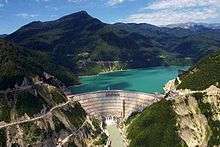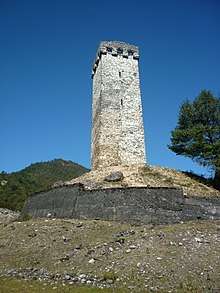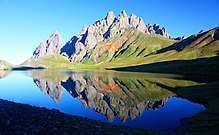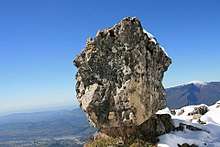Jvari
Jvari is a town in Samegrelo.
- Not to be confused with Jvari Monastery near Mtskheta in eastern Georgia.
Understand
Jvari is a very old settlement in the north-west of Georgia in the Tsalenjikha municipality. It sits at the foot of the Caucasus mountains, at the gateway to Mestia. Today Jvari has a population of around 10,000 and is a quiet place surrounded by natural beauty. The area is not as well-known for sightseeing as Kutaisi or Mestia, but it has a few gems to discover. The trip to Silver Lake is one of the most impressive alpine treks that you can do in Georgia and the Enguri Dam is an impressive architectural feat and a beautiful spot.
Jvari is located where the Magana River and Enguri River meet at an altitude of 280 metres. The town is divided in two with "Jvari" lying on the Zugdidi-Mestia highway, and Jvarzeni (Upper Jvari) up the hill. The summer is hot with the great weather lasting until October. By November it quickly turns cold and there will be snow. The snow melts in February and it becomes warmer in March. According to the legends we can suppose that Jvari has a 2,000 year old history. There are still remains of a medieval castle. In Georgian the word Jvari means 'cross'. Like everywhere else in Georgia you will see a few of these around. The Enguri Dam is an important part of Jvari's economy. There are three schools, a vocational college and a community centre funded by a German organisation. Many children are studying languages, art and dance and enjoy learning more about foreign cultures.
Get in
- From Zugdidi - The marshrutka to Jvari leaves a minute's walk from the main marshrutka station in Zugdidi. It is located just across the bridge, but just ask "sad aris Jvari marshrutka". This journey will take 30 min and cost 2 lari.
- From Kutaisi - The marshrutka to Zugdidi leaves from the marshrutka station behind the McDonald's (on the west side of the city on Chavchavadzis Gamziri). It will take up to two hours and cost 7 lari. In Zugdidi connect with the Jvari marshrutka as described above.
- From Mestia - The marshrutka to Zugdidi leaves from the central marshrutka station in Mestia every two hours. Just ask and the driver will drop you off in Jvari. This journey will take up to three hours and will probably cost 15 lari, because that is price to the slightly further destination of Zugdidi.
Get around
Most of the town is navigable by foot. There are also regular marshrutkas that link Jvari to Jvarzeni (Upper Jvari). However, the best sights are out of town and will provide a great hike, guided hike, or drive. There is a small tourist information desk inside the Liberty Bank/Community Centre on the main roundabout. Information opening hours are usually limited from 3-5PM, but the folks inside the bank should be able to link you with the information officer.
See

- 🌍
Enguri Dam. Enguri Dam is one of Europe’s largest dams. It's a hydroelectric dam on the Enguri River and is currently the world's second largest concrete arch dam with a height of 271 metres. Known as Engurhesi to locals, construction of the dam began in 1961, was opened in 1978, and was completed in 1987. The dam is located just north of the town of Jvari, while the power station is located in Abkhazia. Its average annual capacity provides 46% of the total electrical supply in Georgia. Currently Enguri Dam is free to visit and walk across. From Jvari it's a short drive. Alternatively you can walk or cycle there, but this is just alongside the road.
The dam needed a lot of repairs between 1994 and 1998. Asian and European governments and organisations loaned millions of dollars to complete the repairs and to ensure safe water evacuation to the Black Sea. In 2015 the dam was granted cultural heritage status by Georgia. There are plans for a tourist centre with a museum/information space, a rope road, an open concert space, water activities, a 280m high elevator, and the exploration of dam tunnels. Free to enter.

- Omune Observation Tower. Just a couple of kilometres past Jvari, on the road toward Mestia, is a medieval observation tower. Free to visit.
- Otchane Church (St. Andrew's Church and St. Nino's Nunnery) (just 2 km from Jvarzeni). A new church from 2003 while the nunnery was opened in 2011. The district of Otchane is near the hill where St Andrew once erected a cross. Historically Otchane is connected with Tchanebi, a place where the local Tchans lived. According to some stories this district was considered to be the gathering place where sacrifices are presumed to be held or where people solved public affairs. At the church they have rabbits, dogs and fawns. Every Sunday is a traditional service with Georgian chanting. Free to visit.
- Three Stones. Behind Jvari School #3 is a small hill with three slim stones atop. This is a popular place for locals to go, and it provides nice views of the town. Free to visit.
Silver Lake

- 🌍 Silver Lake (Tobavarchkhili). Free to enter.
Tobavarchkhili means "Silver Lakes" in the Megrulian language. These lakes are located in Samegrelo on the southern slopes of the Egrisi Mountains. There are several small lakes surrounding the main one and all of them are beautiful in their own right. The main lake sits at an altitude of 2,650 m and is surrounded by snow-capped peaks even in the summer. The fresh water is fed by snow, rain and ground water and is a beautiful clear blue.
The best period for traveling starts from mid-June and lasts until mid-September. The water level is highest in the month of July. The only way to reach the Silver Lakes is by hiking for at least three days and 60 km. On average it will take 4-5 days. You may pass river gorges, forests, beautiful alpine valleys, snowy passes at altitudes up to 3,000 m, two big alpine lakes surrounded by stunning peaks, two-four smaller alpine lakes, waterfalls, canyons, glaciers, caves, stunning panoramas, and unreal landscapes enshrouded with fog. You will need to sleep in tents or shepherds huts where you can try Georgian cheese and Georgian vodka.
This is a difficult trek and inclement weather can make everything worse. Visitors need to be physically fit and equipped with appropriate clothing and boots. A guide for this trek is recommended and should be organised in advance. You will have to carry all the food and camping equipment with you, although donkeys can be hired to do the "donkey" work. Most treks will start from the village of Mukhuri, or you can hire a jeep to take you as far as possible to cut your hiking time down. The local legend about Tobavarchkhili is that this neat lake can't stand the dirt. If somebody washes his hands and body in the lake it becomes angry and causes rain to start within an hour. The rain will stop only when the lake becomes pure again.
You can download the GPS track to reach the lake directly, on GPSies, or consult OpenStreetMap for alternative routes, which is also used by this travel guide, and by many mobile Apps like OsmAnd (complex with many add-ons) and MAPS.ME (easy but limited).
Otherwise, several companies offer treks (5-8 days) to Tobavarchkhili. Ask around in Zugdidi or Jvari.
Do
- Intsira Waterfall (Drive to Jvarzeni and turn off near Jvari School #3 where there is a sign to the village of "Chkvaleri". Go through the town of Chkvaleri and follow the signs to the waterfall. Waterfall in Georgian is "chanchqeri".). Some wonderful nature 10 km away from Jvari with a 10 m high waterfall. Free to enter.
Shaking Rock (Kuakantsalia)
A massive limestone boulder, weighting 10-12 tonnes, perched atop a bed of rock, at an altitude of 1,800 m in an almost treeless alpine area. The slightest pressure from a hand on the rock starts it shaking and making a knocking sound. Similar stones be found in other countries, but most of them are volcanic rock. A guide will be useful, but this can also be found by using GPS. Free to enter.

The local legend about Kuakantsalia is that many centuries ago there was an enormous cannibal giant in the mountains of Egrisi, where the pure rivers Tsiskvilara, Chanistskhali, Intsira, Morozha and others flow. The giant visited the villages of Samegrelo and once a month kidnapped boys and girls to be eaten. The people were always afraid and suffered. There also lived a brave young man whose name was Aramkhut and the people believed that he could defeat the giant. The people asked Aramkhut to help them. Aramkhut said that he would begin and got ready for his battle with the giant. He went to the mountain Okhachkue and after a long time waiting the giant appeared. The distance between Aramkhut and the giant was 10km. Realizing the fact that it was impossible to negotiate with the giant, he took a huge stone and threw it at the giant but with no effect. The giant was disturbed and started throwing stones at Aramkhut. After a long rock-throwing battle, Aramkhut took a huge rectangular stone, took aim and threw it. To his amazement the stone killed the giant. The size and the weight of the giant formed a massive hole where he fell among the bright green grass. The villagers celebrated the victory. Aramkhut was taken to Kvira mountain in triumph. He recovered the enormous stone that killed the giant and took it and put it on the place where it could shake by merely touching it with a finger. This story is told from generation to generation to celebrate the victory of kindness and the defeat of evil. Believe this or not, the stone really shakes.
Buy
Better souvenirs are available in Zugdidi and Mestia. The markets in Jvari are limited.
Eat
In Jvari (Lower Jvari):
- Coffee Time - good quality breads, pastries, and other Georgian dishes.
- Shuarma - shwarma, pizza, burgers etc.
- Cafe/Bar Jvari - just before the hill to Jvarzeni is this restaurant offering typical Georgian dishes - khatchapuri, lobiani, salads, fries etc.
In Jvarzeni (Upper Jvari):
- Le Ni Lu (ლე ნი ლუ) - The best eatery in town with lots of tasty Georgian classics and friendly service, highly recommended. Khatchapuri (1-6 lari), lobiani (1-5 lari), kubdari (4 lari), pizza (2-6 lari), khinkali, salads, plus cakes, sodas and coffees. Near the market and DVV, but just ask for help finding it.
- Golden Eye - traditional Georgian food.
Drink
The usual Georgian alcoholic beverages are available everywhere.
Sleep
- 🌍 Savanna Guest House, 141 Andria Pirvelcodebuli Street, ☎ +995 5 9119 7360 , +995 5 7731 5677. Check-in: 11AM, check-out: 1PM. Savanna House Jvari is a Georgian home that offers pet-friendly accommodation in Jvari. The owner speaks passable German and her off-site daughter speaks English. Shared bathrooms. Free wifi. Free private parking available on site. There is a shared kitchen. Towels provided. Triple 30 lari, double 30 lari, single 20 lari, negotiable..
- Guesthouse, 139 Andria Pirvelcodebuli Street, ☎ +995 568-645-583. Check-in: 1PM, check-out: 11AM. An alternative guesthouse right next to Savanna Guesthouse.
Connect
There are a couple of internet cafes around town. The guesthouses and hotels should have reasonable wifi.
Go next
The nearby city of Zugdidi is 32 km away. Kutaisi, the third biggest city in Georgia, is 103 km away. If you travel via Zugdidi the journey is 133 km. Kutaisi International Airport is 110 km away - for the airport the easier road to take is via Zugdidi. The popular mountainous town of Mestia is 111 km away. The Russian-occupied region of Abkhazia is not far from Jvari, with the main city of Sukhumi 140 km away. However, there is a large military presence and no easy way to enter unless you are a Russian citizen.
- From Jvari to Zugdidi (ზუგდიდი) - The marshrutka to Zugdidi leaves from the roundabout in Jvarzeni (Upper Jvari) every half an hour. You can pick up the marshrutka at the roundabout in Jvari by flagging down the driver. Just ask for help from any local ("me minda Zugdidi marshrutka). This journey will take 30 minutes and cost 2 lari.
- From Jvari to Kutaisi (ქუთაისი) - First take the marshrutka to Zugdidi as described above. This will probably end at the central market. Connect with a marshrutka to Kutaisi by walking 5 min to the train station. This is where trains, buses and marshrutkas depart for Tbilisi, Kutaisi, Poti and others. To Kutaisi it will take up to two hours and cost 7 lari.
- From Jvari to Mestia (მესტია) - the marshrutka from Zugdidi to Mestia may be full and may not stop for passengers in Jvari. Therefore it is easier to take the marshrutka back to Zugdidi, then connect with a marshrutka travelling to Mestia. From Zugdidi the journey to Mestia will take up to three and a half hours and cost 15 lari. The easiest option is actually to "avtostop". Lots of traffic heads to Mestia and hitchhiking is common in Georgia. The driver will expect a contribution for gas and this can be negotiated - maybe 0 lari, maybe 5 lari, maybe 10 lari.
- Martvili Canyon - a canyon, monastery, waterfall, and picturesque river near Martvili
- Tsiskvili - a nice river and waterfall near Skuri.
- Anakhlia - a nearby Black Sea resort